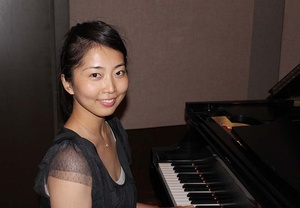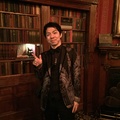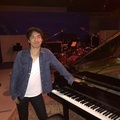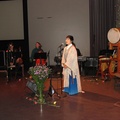Ms. Megumi Sasano, native of Izumisano, near Osaka, Japan, and now a newfound treasure to the entertainment industry of Los Angeles, has received her first anime credit for the iconic manga series Zetman. The first episode of the season aired in April 2012. Megumi shares screen credit with one other composer, Gabriele Roberto, with whom the labor of scoring has been divided. In addition to Zetman, she has been working with Ilsley music on some major features, one of which is an Ethan Hawke film to be released in October.
Her expedient lunge into the realm of Anime comes as no surprise after having studied film music composition at the University of Southern California’s (USC) prestigious program, Scoring for Motion Pictures and Television (SMPTV), graduating in May of 2011. For Megumi, her academic experience in the U.S. was quite different than her formal music studies in Japan. “The experiences were completely different. I focused on classical concert composition in Japan. There are no schools in Japan devoted to film scoring. USC’s film school is relevant to current writing. It was very, very, very interesting.” And, when asked about any drastic cultural differences living in Los Angeles, or about the difficult challenges in leaving her Japanese way of life she was happy to say, “Actually, most things remain consistent. Even Japanese food I can get here in Little Tokyo and throughout Los Angeles. So it hasn’t been difficult to adjust in that respect.”
But, Megumi’s adaptation to the American lifestyle has not been completely without hardship. Having to learn English fluently and keeping pace with Americans during class time helped her to gain command of the language, but she earnestly expressed, ‘The biggest struggle here has been communicating with people that have a different language. I’ve found communicating clearly and avoiding miscommunication has been a challenge-it hasn’t been easy.” The yearning for one’s native tongue and familial relationships are common threads for anyone who has emigrated; there is always that hint of sentimentality about one’s homeland. “I miss my family the most and my friends, but I keep in touch with them all the time! I also miss the hot springs!” Technology does indeed bridge the geographical gap and Megumi and her mother have their “daily Skype” sessions to ensure their closeness.
I was curious to know if there were any self-identifying characteristics of Megumi’s Japanese identity that she felt would contribute to achieving her professional goals. She replied, “Japanese are very disciplined about most things. They approach things ‘seriously’. That’s how I approach most everything here in the states.” This mode of seriousness has carried her far and served her well, as it can be detected between music professionals. The Zetman producers recognized her talent, and her serious attitude as a composer.
Megumi is entrusted to bring the emotional moments of the Zetman series to life on screen with her carefully crafted compositions that utilize a string quintet, piano, guitar and percussion. This naked, intimate music gives an identity to the series, and leaves nothing for the composer to hide behind. This delicate work is called upon especially for these early episodes which, as Zetman aficionados are aware, set up the emotional backdrop for the entire series and make Zetman more than just another action series.
The early episodes, whose story-telling is accomplished with Megumi’s help, show the story of an unusual child, child ZET (aka Jin), who experiences the horrific loss of the people closest to him and who must consequently decide for himself how to use the remarkable gifts he is given. The music embraces complex elements of the human psyche and like all good film music, can be listened to in isolation from the visuals and still tell a literary story that treads along a deep and emotional track. Megumi’s innate talent and her in-depth studies have surely enabled her to lock in the emotions necessary to deliver Zetman a most dramatic accompaniment.
After eavesdropping on a studio session in Los Angeles where Megumi was hired as a violinist, I was drawn to her not only for her virtuoso musicianship, but for the warmth of her smile, which she generously shares upon a gentle handshake, accompanied with a traditional Japanese bow.
She later allowed me to hear some of the music that makes up the world of child Jin by itself. The first cue of the series is carried primarily by acoustic guitar and piano played by Megumi, who is classically trained and a concert pianist. The piano music is subtly reinforced by the intertwining of a string quintet. This unusual combination of instruments is strikingly effective at making up a child’s sound world, with the percussion and pop guitar giving motion and lift, and at the same time bringing a depth of emotion by use of string quintet. As I was watching this cue in the first episode I was struck by how perfectly it supported the drama: just enough to feel natural and a little extra to make it sparkle and give an identity to Zetman. For those of you who appreciate scores that actually embellish a storyline, take a deep breath, and be ready to hear some of the best anime music yet.
I was curious to hear which composers Megumi may have found to be her consummate role models, or perhaps served as personal inspirational forces. She paused momentarily and then smiled answering with a straight-ahead sort of admiration for most of the great composers in my book. “I wanted to be a film composer because of the scores of James Horner and Hans Zimmer. My tastes have broadened quite a bit since then. I think every genre of film music has its champions; for quiet piano scores Thomas Newman and Alexandre Desplat are my favorites, and for rhythmic scores, John Powell has written some of the best contemporary scores. I also share a common belief that John Williams is the greatest of all film composers.”
Megumi Sasano is indeed a treasure along the lines of a bright shiny pearl, bringing her exceptional talent and exuberant personality from Japan to the international cinema audience, anime connoisseurs and music lovers around the world. With her strong work ethic and will to succeed, I have no doubt that we will be reading more about her work in the future to come. With a little luck, I hope to see Megumi’s credits rolling on the silver screen and reflect on this moment when I saw the sparkle in her eyes as she dreamed of the vast opportunity in front of her. This vibrant Japanese artist is living the American Dream.
To contact Megumi or to hear more of her work, please visit her website: megumisasano.com
Megumi is also listed on IMDb at: http://www.imdb.com/name/nm4982979/
© 2012 Rachelle Cano






